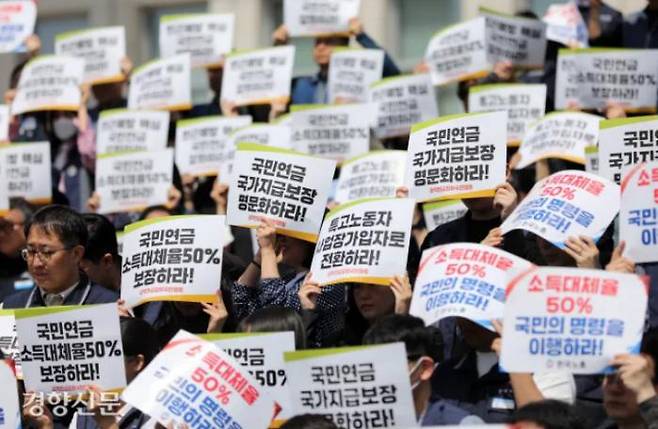Ruling and opposition parties have mixed reactions to national pension reform bill of ‘paying more and receiving more’
이 글자크기로 변경됩니다.
(예시) 가장 빠른 뉴스가 있고 다양한 정보, 쌍방향 소통이 숨쉬는 다음뉴스를 만나보세요. 다음뉴스는 국내외 주요이슈와 실시간 속보, 문화생활 및 다양한 분야의 뉴스를 입체적으로 전달하고 있습니다.

The ruling and opposition parties had mixed reactions to the national pension reform bill of “paying more and receiving more,” which was most supported by the citizens' representatives of the National Assembly's Special Committee on Pension Reform. The main opposition Democratic Party of Korea (DPK) expressed a positive stance, saying, "Increasing guaranteed income is the will of the people," while the ruling the power of the people expressed a negative stance, criticizing, "It's a bad thing that allow pensioners pay a little more and receive more than that."
Joo Ho-young, chairman of the Special Committee on Pension Reform and PPP lawmaker, met with reporters on April 23 and said, "The pension reform is meant to fix the unfair reality for the younger generation, but I wonder if it is effective enough.” He added, "According to the current reform plan, the remaining period until the depletion of pensions will be extended by six to seven years, followed by a sharp deterioration in finances. The failure to solve the depletion problem is itself the burden on future generations and two opposite sides of the same coin.”
Yoo Kyung-joon, the PPP’s secretary at the Special Committee on Pension Reform, pointed out on his social media account that “the future of the youth and the country will be bleak if we forget that the national pension has a certain income redistribution function, but it is mainly determined by the principle of insurance, where the amount of premiums is determined by the contributions made by the individual.”
Chun Ha-ram, a newly-elected lawmaker of the Reform Party said on his social media account, “This is a bad reform of generational selfishness that will break the spine of future generations.” He criticized that “it is said that a person born in 2015 will pay 35.6 percent of his or her monthly salary as national pension premiums when they turn 46. How can they make a living if they pay more than 35 percent of their salary as national pension premiums and additionally pay health insurance premiums and income taxes?" He added, “We need to introduce a completely accumulated new pension in consideration of intergenerational equity, and have a fundamental reform on the national pension that separates the old pension from the new pension. Should we bring greater bombs and despair to future generations in an era when hopes for the future have already faded and marriage and childbirth have been abandoned?"
※This article has undergone review by a professional translator after being translated by an AI translation tool.
Copyright © 경향신문. 무단전재 및 재배포 금지.
- 일본 목욕탕서 700장 이상 불법도촬한 외교관···조사 없이 ‘무사귀국’
- 서울 다세대주택서 20대 남성과 실종 신고된 10대 여성 숨진 채 발견돼
- 안현모, 이혼 후 한국 떠나려고···“두려움 있었다” (전참시)
- 아이가 실수로 깨트린 2000만원 도자기, 쿨하게 넘어간 중국 박물관
- 인감증명서 도입 110년 만에…9월30일부터 일부 온라인 발급 가능해져
- “하이브·민희진 분쟁은 멀티레이블 성장통” “K팝의 문제들 공론화”
- ‘유시민 누나’ 유시춘 EBS 이사장 사무실 압수수색
- 김신영 날린 ‘전국노래자랑’ 한달 성적은…남희석의 마이크가 무겁다
- 국가주석에 국회의장까지 권력 빅4 중 2명 숙청···격랑의 베트남 정치
- 수능 6등급도 교대 합격···상위권 문과생들 “교사 안 할래요”